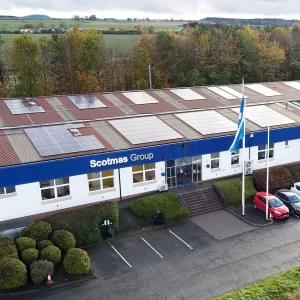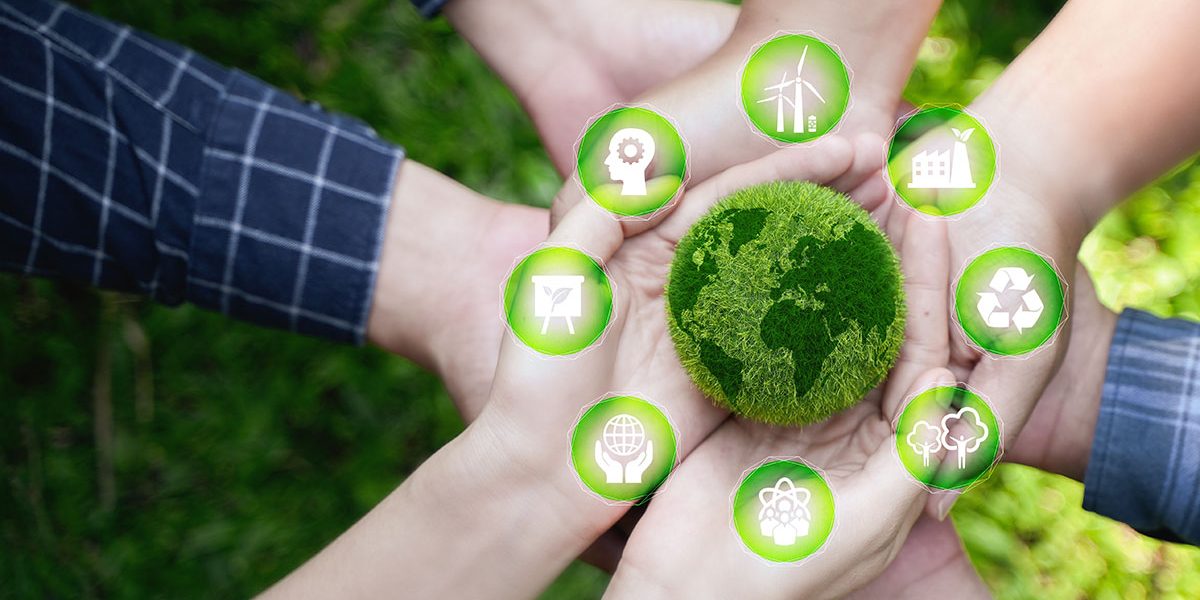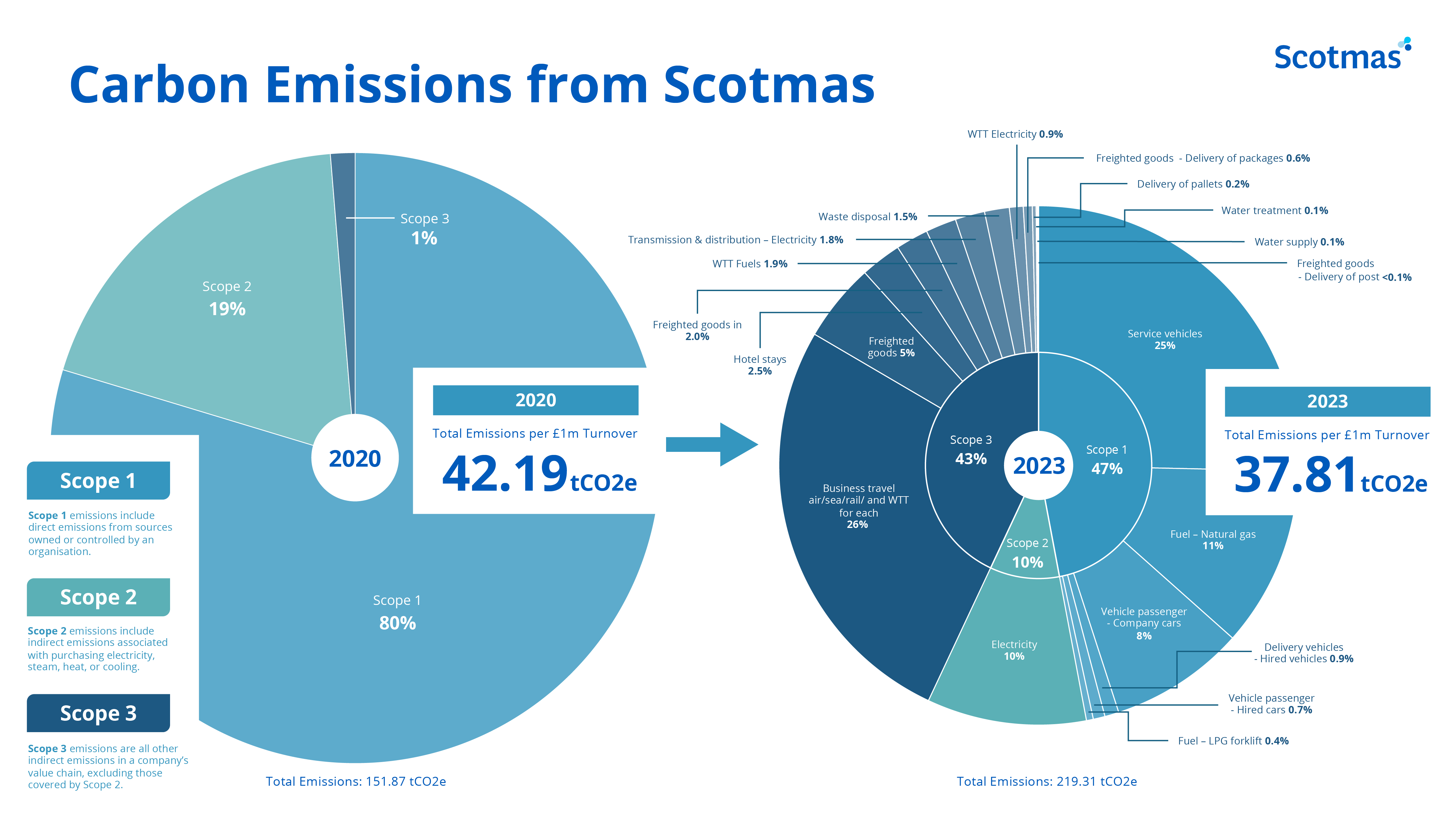Scotmas CEO Alistair Cameron shares the company’s journey towards Net Zero.
When COP26 took place in Glasgow in 2021, Scotmas boldly committed to becoming a Net Zero organisation by 2025.
With just over a year to go, we want to share the highs and lows of our journey over the past three years and discuss how climate change aligns with our broader Corporate Social Responsibility (CSR) goals as we work toward B Corp accreditation.
Achieving Net Zero is particularly challenging for small and medium-sized enterprises (SMEs). Initially, our efforts focused on identifying and quantifying various carbon sources. Despite the difficulties, we have made significant progress, reducing our emissions by more than 10% compared to our low COVID-19 baseline.
Our enhanced understanding of CO2 sources allows us to target the most significant reduction opportunities. Offsetting our carbon emissions to become a “Net Zero” organisation costs approximately £3,500 per year (£15 per ton).
About Scotmas
For those unfamiliar with Scotmas, we are a 55-person SME based in Scotland. We specialise in the research, innovation, and manufacturing of water treatment equipment and chemicals for global markets. You can learn more about us by exploring our website.
Progress Since 2020
The graphic above details our progress from 2020, our baseline year, a year with minimal UK or overseas travel and a limited understanding of Scope 3 emissions. Our initial carbon estimates relied on online tools and limited supplier information.
By 2023, our Green Team had excelled in collaborating with our supply chain to better understand the embedded carbon in our raw materials and transportation. We now adhere to the Scope 3 standard set by the GHG Protocol’s Corporate Value Chain (Scope 3) Standard. This has expanded our declared carbon emissions baseline beyond 2020 figures, more accurately representing our environmental impact.
Our business has grown significantly since 2020, with our service vehicle fleet covering the UK and our senior engineers travelling as far as New Zealand and Brazil to support our water disinfection systems. These factors would have doubled our 2020 carbon emissions if not for the pandemic.
Future Plans and Technological Advancements

We installed 85 kWP solar panels on the roof of our head office in Kelso, Scottish Borders, in 2021.
In 2022, we trialled electric vans, but their limited range precluded a wider rollout. With technological improvements, we plan to introduce a new fleet of e-Transporter and e-Transit service vehicles next year, reducing our emissions by approximately 25%. We will replace vehicles as planned without accelerating the schedule.
Gas and electricity currently account for 21% of our emissions. We have invested in an 85 KWp solar installation supported by Zero Waste Scotland. However, balancing in-house solar generation with demand has been challenging, often resulting in excess energy being returned to the grid. We are exploring battery storage and converting our remaining gas boilers to heat pumps to optimise green power usage.
Commitment to Customer Support and Sustainable Practices
Despite utilising Teams, Hololens, and other AR and online meeting technologies to reduce travel, our commitment to providing our customers with the best technical and operational support remains unwavering. We recognise the importance of travel in our global business and are encouraged by the introduction of Sustainable Aviation Fuel (SAF). We are also expanding our trained and certified in-country service teams to offer more local support, though travel-related emissions are inevitable in our operations.
In-House Efforts and Collaborative Approach
Our dedicated in-house team has carried out all our work on this project, and I am immensely proud of their efforts to understand and address climate change within our business. While we will use offsetting to mitigate unavoidable emissions, we are committed to addressing emissions that we can feasibly control rather than simply buying carbon credits to claim a “Net Zero” status.
Sharing Knowledge and Seeking Collaboration
We are eager to share our knowledge, templates, resources, and methodologies with other SMEs embarking on the Net Zero journey and those committed to the SME Climate Hub. We welcome guidance from others who see areas for improvement.
Addressing climate change requires a collective, comprehensive approach that integrates carbon accounting into everyday business operations, just as quality and health & safety have become ingrained in our practices. Let’s work together to make sustainability a core part of our business practices, ensuring a better future for all.
Contact us today to learn more about our initiatives and how we can support each other in this vital endeavour.







